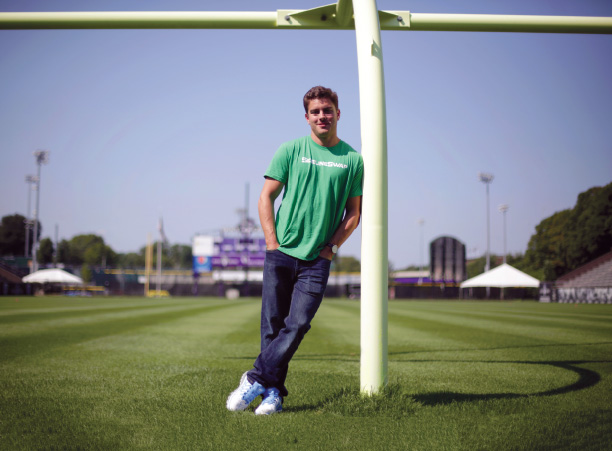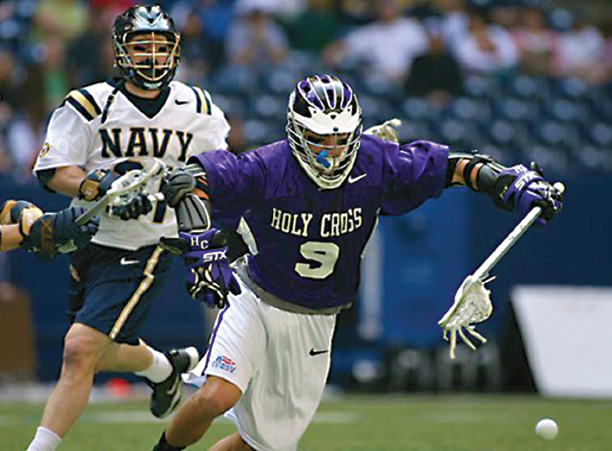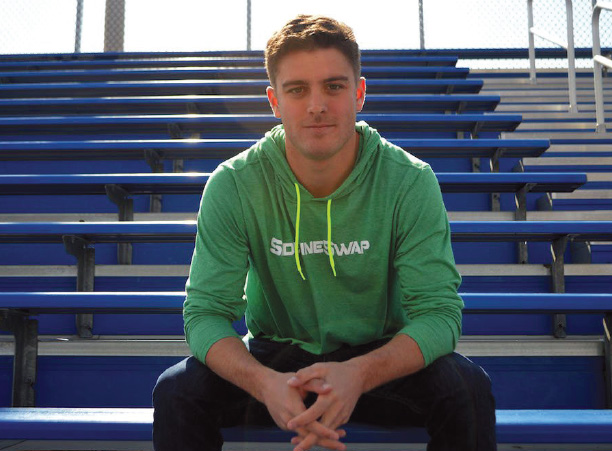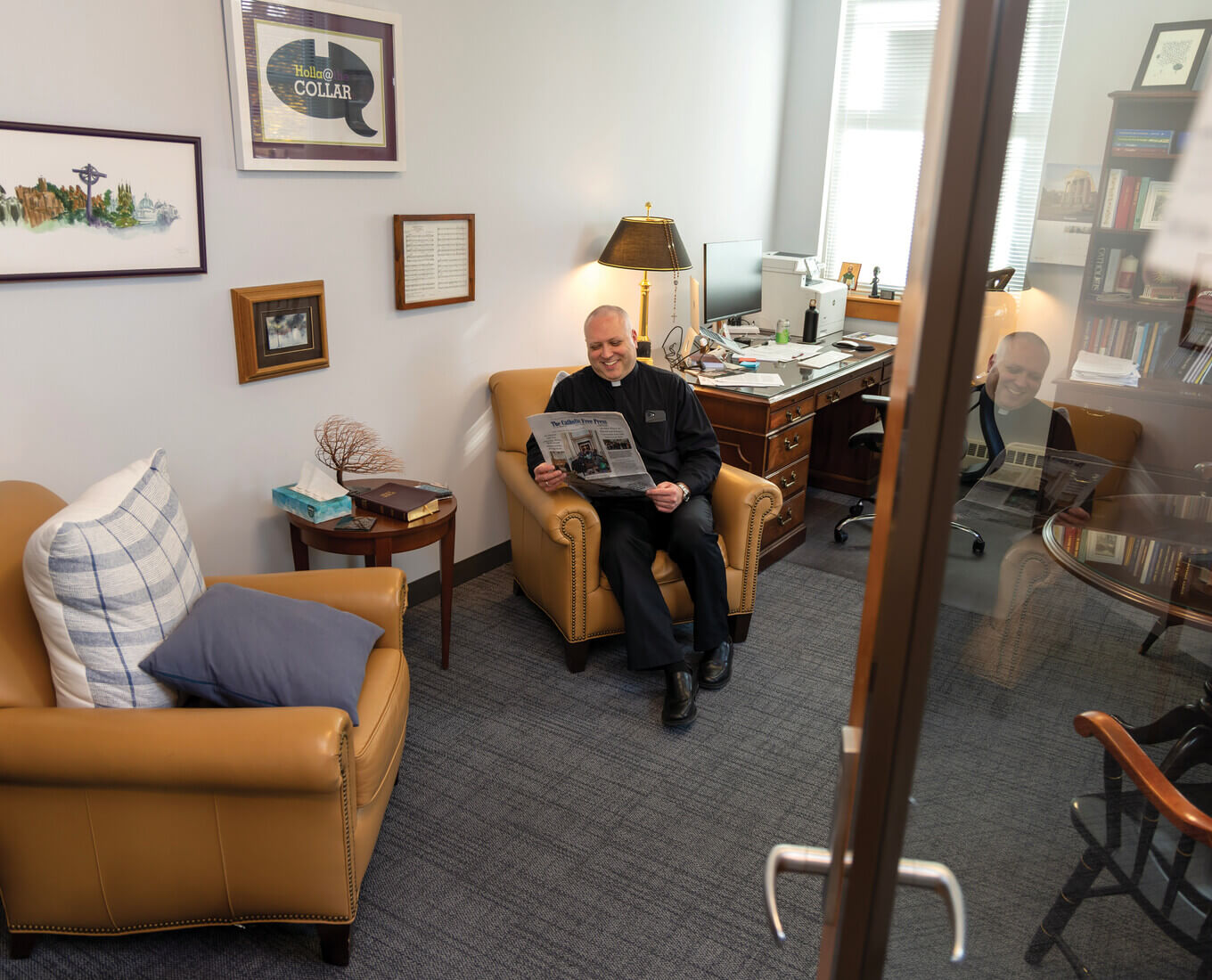varsity lacrosse team at Holy Cross, he received all the equipment he needed: sticks, gloves, pads, you name it. It was a few years after graduation, when he was volunteering as a coach for a youth team and playing in a men’s league, when his equipment started to wear out.
“I had to go and get new equipment for the first time in a long time, and I forgot how expensive this stuff is,” Candon says. Lacrosse sticks and helmets can cost anywhere from $100 to $200 each, and even the least expensive pair of gloves rings up at $50.
“My parents had always asked around about where to get affordable equipment, but when I actually had to go do it myself, I realized that there really wasn’t a good spot to find it. I ended up buying equipment from a friend I went to high school with who also played lacrosse in college, and saved a couple hundred dollars in the process, instead of going to a store.”
This transaction between friends sparked a conversation that became a side business, and now Candon is the CEO of SidelineSwap, an online used sporting goods marketplace that has been praised by Forbes for “making sports more affordable for Gen-Z customers.”
Increasing Access to Sports
You can find gear for hockey, lacrosse, skiing, baseball and golf on SidelineSwap – even motocross equipment. Candon and his team are open to selling equipment for any sport, and there are both web and app versions of SidelineSwap. Sellers post their equipment on the listing page, including photos and required information that varies depending on the item (like size, brand, fit, etc.). It is free to list equipment, and the site recommends a price point.
The prices are always lower than what customers would find in a sporting goods store, where hockey sticks routinely sell for over $100 each, baseball gloves cost $200 and football cleats cost more than $150.
Candon and his team take a small commission from each sale, which is how they bring in their profit. But profits aren’t the bottom line at SidelineSwap. “Our goal is to make SidelineSwap a resource for every sports family to access high-quality used equipment affordably and to sell all their extra stuff,” Candon says.
 Candon, here on Fitton Field, came up with the idea for SidelineSwap when the lacrosse equipment from his Holy Cross days wore out. He had to buy new gear and realized there wasn’t a spot for athletes to buy and sell quality secondhand equipment. Photo by Tom Rettig
Candon, here on Fitton Field, came up with the idea for SidelineSwap when the lacrosse equipment from his Holy Cross days wore out. He had to buy new gear and realized there wasn’t a spot for athletes to buy and sell quality secondhand equipment. Photo by Tom RettigOne customer shared: “I’m a former college hockey goaltender who has not played in 17 years due to serving in the Army. After my most recent overseas deployment, I decided to get back into the game. Your site helped me get a full set of equipment for around $1,300 (instead of $2,500 new). I’ll be back on the ice this month. With my 6-year-old son playing now, we plan to use SidelineSwap as he grows out of equipment. We’ll need new equipment, and can sell his older equipment for another kid to use.”
The Power of Sports Participation
Research published by the Sports & Fitness Industry Association (SFIA) in 2015 indicates that participation in youth sports has been in decline since 2010, and cost is a major factor. Not only is equipment expensive, but there are also fees to participate in school sports at both the middle and high school levels, and a growing emphasis on expensive travel leagues.
Gary Senecal, a visiting assistant professor in the psychology department at Holy Cross, says that these financial obstacles make it difficult for parents and caregivers from middle to lower socio-economic classes to sign their children up for sports. And that, in turn, can impact their children’s development, because sports have the potential to foster qualities that will be invaluable as children reach adulthood.
“Sports that require the purchasing and repurchasing of equipment are simply too costly for many Americans as their children undergo regular growth spurts season-to-season. At the same time, we also know the deep benefits that sport, play and competition have on the biological, psychological and social development of children and youth as they navigate the murky waters of development,” Senecal says. “Children thrive in environments that offer them the opportunity to develop intrinsic motivation, industriousness, solidarity, resilience and empathy. Sport, when harnessed appropriately, is an ideal conduit for the cultivation of these abilities.”
 Wearing #9, Brendan was a three-year starter on the lacrosse team at Holy Cross. Photo courtesy Holy Cross Athletics
Wearing #9, Brendan was a three-year starter on the lacrosse team at Holy Cross. Photo courtesy Holy Cross AthleticsBuilding the Business
After their initial conversation about expensive equipment, Candon and his co-founder, Anthony Piazza (the same friend who sold him the used lacrosse gear), thought there was a hole in the marketplace, so they did some research to prove it. They found that fewer than 15 percent of the sporting goods listings on eBay are used, and most sellers on that site are stores or companies, rather than individuals. Craigslist didn’t allow buyers to search for specific sizes of gear, and Play It Again Sports, a used sporting goods chain, did not have an online presence and was closing many of their brick and mortar stores. Candon and Piazza also looked to similar platforms in different industries – like Poshmark for women’s clothing, Reverb for musical instruments and Etsy for arts and crafts – as a model.
“For us, that meant that, one, people aren’t going to eBay, Craigslist or Play It Again Sports to sell their used stuff and two, buyers don’t really have a lot of options,” says Candon, who was a political science major and a history minor. “Looking at those three companies, we thought it seemed like there was an opportunity to fill a need in the market, where we knew athletes wanted access to high-quality gear, but they didn’t have a place to find it. We didn’t have a lot of background in the startup world or technology, but really believed that we understood the market and could figure this out.”
The earliest version of SidelineSwap came out in 2012, and Candon worked on the project during his free time for about two and a half years. By 2014, they had garnered enough interest and investments, including some from Holy Cross friends and advisers, that he quit his insurance job to work on SidelineSwap full time and assemble his team.
It was a long road from the side project that Candon toiled away on during his nights and weekends to earning praise from Forbes. Candon and his team mastered the art of networking, and participated in programs designed to give startup companies advice and funding, including the Harvard Innovation Lab in Boston and 500 Startups, one of the top tech accelerators in Silicon Valley.
 This photo of Candon ran in Forbes, which lauded his work and SidelineSwap in the article “How This Millennial CEO Is Making Sports Affordable Again For Gen-Z Consumers.” Photo courtesy Brendan Candon ’10
This photo of Candon ran in Forbes, which lauded his work and SidelineSwap in the article “How This Millennial CEO Is Making Sports Affordable Again For Gen-Z Consumers.” Photo courtesy Brendan Candon ’10Today, they count former Etsy CEO Maria Thomas as one of their investors and Chandhu Nair, senior director of global ecommerce at Staples, as an adviser. SidelineSwap has 120,000 users and is on track to earn $5 million in sales this year.
“From day one, our customers loved the product, and that always fueled us. We had a lot of tough times when we were personally in debt and heard ‘no’ from well over 100 investors, but luckily a couple of them said yes,” Candon says.
Support from the Holy Cross Network
In addition to initial investments and support from Holy Cross friends and former teammates, the alumni network was also key to getting SidelineSwap off the ground. Candon sought guidance from Professor David Chu, the director of entrepreneurial studies at the College, and attended Holy Cross Entrepreneurs Group events in New York City, where he found a mentor in fellow alumnus Tom Kiernan ’92, the founder and CEO of ClickPay, a service for property managers and landlords that allows them to bill and collect payments online.
Kiernan is also a former Crusader lacrosse player, still gets out on the field himself, and has three young children playing sports, so he says SidelineSwap made complete sense to him from the beginning.
“As a fellow entrepreneur, I know it can be difficult getting the business going. Cash is always tight. You are continuously looking for funding, and you are often surrounded by people who unintentionally create doubt about whether the business will survive,” Kiernan says. “I wanted to encourage him to keep pressing forward and not be afraid to make changes to the business model and try new strategies. I am a big fan of SidelineSwap and an even bigger fan of Brendan.”
Not only does Kiernan mentor Candon, but he also buys and sells equipment on the site for himself and his family, because he believes in the model.
To maintain quality, SidelineSwap offers a buyer guarantee and the opportunity to leave feedback for every seller. They’ve also developed a messaging tool that allows users to interact and learn more about products before purchasing.
“Most of our users are under 25 and actively playing sports, so they can tell each other about fit or brands,” Candon says. “Our community replicates the expertise that you would usually get in a sporting goods store.”
Changing Customers’ Lives
This focus on the customer encapsulates the mission and philosophy of SidelineSwap, and keeps Candon focused during hectic days where his role changes constantly.
As founder and CEO, he works on the big picture, from fundraising to new projects that will help the business grow, as well as more everyday tasks, like acting as human resources and the office manager. The company is based in Boston and looking for office space – the 10 employees, many of whom are former college athletes like Candon, work from home for now.
 The SidelineSwap team, from left: Seann Ives, back-end developer and architect, Eric Carlstrom, CTO, Pin-Bo Tsai, product and UX/UI designer, Nick Allevato, front-end developer, Kevin Guiltinan, business development, Brendan Candon, CEO, Nick Gantsoudes, community, and Conor McDonough, growth. They call Lunar, the horse pictured in the back at left, their “muse.” Not pictured: Anthony Piazza, co-founder/business development. Photo courtesy SidelineSwap
The SidelineSwap team, from left: Seann Ives, back-end developer and architect, Eric Carlstrom, CTO, Pin-Bo Tsai, product and UX/UI designer, Nick Allevato, front-end developer, Kevin Guiltinan, business development, Brendan Candon, CEO, Nick Gantsoudes, community, and Conor McDonough, growth. They call Lunar, the horse pictured in the back at left, their “muse.” Not pictured: Anthony Piazza, co-founder/business development. Photo courtesy SidelineSwapCandon estimates that the cost savings are between 50-70 percent of what players would pay for new equipment. It’s just how he envisioned it five years ago, when he was looking for lacrosse equipment of his own. In the future, he wants SidelineSwap to be the first place people think of when they want to shop for sports gear.
“We’re just scratching the surface. We’re doing a couple million in sales, but sporting goods is a $60 billion dollar industry, and our goal is to be a household name,” Candon says. “We have a long way to go before we get there, and that applies to every sport. We have aggressive ambitions for this because we think it should exist, and if someone is going to do it, we want to be the ones that succeed.”
Written by Maura Sullivan Hill for the Fall 2017 issue of Holy Cross Magazine.
About Holy Cross Magazine
Holy Cross Magazine (HCM) is the quarterly alumni publication of the College of the Holy Cross. The award-winning publication is mailed to alumni and friends of the College and includes intriguing profiles, make-you-think features, alumni news, exclusive photos and more. Visit magazine.holycross.edu/about to contact HCM, submit alumni class notes, milestones, or letters to the editor.


